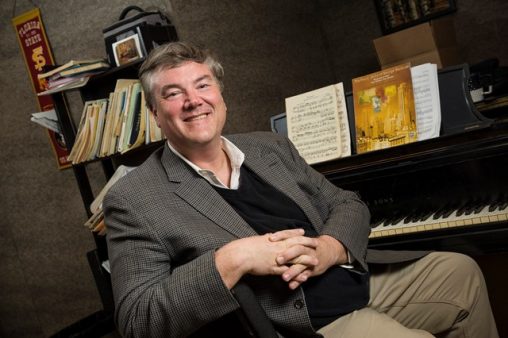
Steven Aldredge, music coordinator of Wright State’s Class Piano program, won a national competition to commemorate the 500th anniversary of the Reformation. (Photos by Chris Snyder)
Choral music composed by Wright State University piano faculty member Steven Aldredge won a national competition to commemorate the 500th anniversary of the Reformation, the religious and cultural movement that helped define the modern era.
Aldredge was chosen as the winner of the Reformation 500 Choral Composition Competition, which was sponsored by the South Dakota Synod of the Evangelical Lutheran Church in America. The work was selected from 32 entries from around the nation.
Aldredge’s composition, titled “O Glorious Word of Life,” had its world premiere Nov. 1 at the Sioux Falls Arena in Sioux Falls, South Dakota. It was part of a worship service and commemoration that featured hundreds of singers and was attended by nearly 5,000 people.
“It’s a slow build with an exalting ending that should — I hope — bring everybody to their feet,” Aldredge said at Wright State a few weeks before the premiere. “I think it will be exciting.”
Aldredge is music coordinator of Wright State’s Class Piano program and teaches class piano, music of western culture and music theory. A lost wallet brought him to Wright State. (More about that later.)
Aldredge grew up in Greenville, South Carolina, where his affinity for the piano came at an early age.
“When I was 5 years old I bugged the church pianist,” he said. “I used to run up to the keyboard when we were done with services and was that kid that bangs on the piano.”
So Aldredge’s parents got their son into piano lessons.
“When I was in high school, I did a lot of piano competitions,” he said. “That was what everybody thought I was going to do.”
But after graduating, he enrolled at Baylor University thinking he would major in German and international affairs and go into law. However, after taking a law class, he quickly realized he didn’t want to be a lawyer.
So he decided to pursue music and transferred to Florida State University, where he earned bachelor’s and master’s degrees in piano performance. He then began working on his doctorate at the University of Cincinnati.
This is where the lost wallet comes in.
Aldredge lost it as he was getting out of his car on a street in Cincinnati in 1998. By chance, a fellow music student who was also teaching at Wright State found it. When he returned it to Aldredge, he mentioned there was an opening on the faculty at Wright State and encouraged Aldredge to apply. He did.
Aldredge says his greatest satisfaction in teaching is seeing students who don’t think they can learn to play the piano do just that. Every music major at Wright State knows how to play the piano in some capacity by the time they graduate.
“They never thought they would be able to play the piano at the level they eventually are able to do,” he said. “And the process happens rather quickly because, with commitment, everybody can learn to play the piano. Don’t let anybody tell you they can’t.”
Aldredge has competed in numerous national and international competitions, performed with leading soloists from the Metropolitan Opera and recording artists from such major labels as EMI, and given recitals with players from many of the world’s leading orchestras, including The New York Philharmonic, The Vienna Philharmonic and The Montreal Symphony. He has also composed over 70 works, including an opera, several sets of songs and various instrumental works.
On Nov. 7, Aldredge performed Gershwin’s “Rhapsody in Blue” for a standing-room-only audience with the University Symphony Orchestra conducted by his Wright State colleague In-Hong Cha, a 2017 Latin Grammy nominee.
“Usually, musical ideas will come out of nowhere, no matter what I am doing, so my phone is loaded with melodies, motives or accompaniment ideas. I’ll sing them in,” he said. “There is usually a stockpile of musical material, but I need time to work out the ideas into something that someone would actually want to hear. And when that time comes, I will usually lock myself away to compose.”
Aldredge had been composing music for his church when he happened upon a website announcing a national competition to find a choral piece to celebrate Reformation 500. So over the following few weeks, he composed a choral piece and submitted it.
“I have to say, though, the composition didn’t come out of nothing,” he said. “I had some musical ideas cooking on the stove; they were on low heat, but they were there. So I started looking for a text I thought would be appropriate to the music and to the occasion.”
When he received the email telling him he had won, “My first thought was, ‘I can’t believe it.’”
Aldredge’s four-minute-plus-long choral work was live-streamed during the world premiere and a video of the performance later posted on YouTube.
“Honestly, it’s very humbling,” he said. “The Reformation and Lutheran choral tradition is foundational to Western music, so knowing that they liked it and chose it for such an important occasion is wonderful. You don’t always get to hear when people like what you do. It’s very affirming.”


 Wright State University Foundation awards Students First Fund grants
Wright State University Foundation awards Students First Fund grants  Cosmic collection
Cosmic collection  Wright State revives student-faculty collaborative writing journal
Wright State revives student-faculty collaborative writing journal  Fulfilling dreams
Fulfilling dreams  Wright State alumna Nicole Scherzinger wins top British theatre award as star of ‘Sunset Boulevard’
Wright State alumna Nicole Scherzinger wins top British theatre award as star of ‘Sunset Boulevard’ 